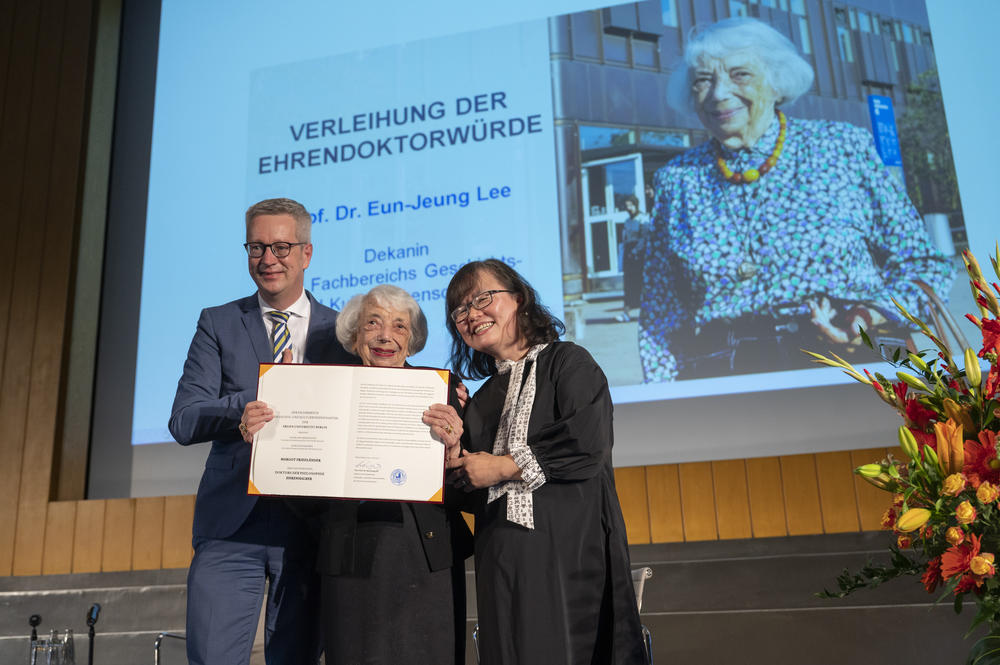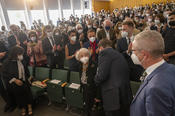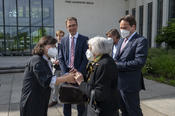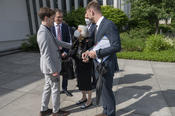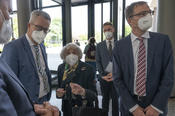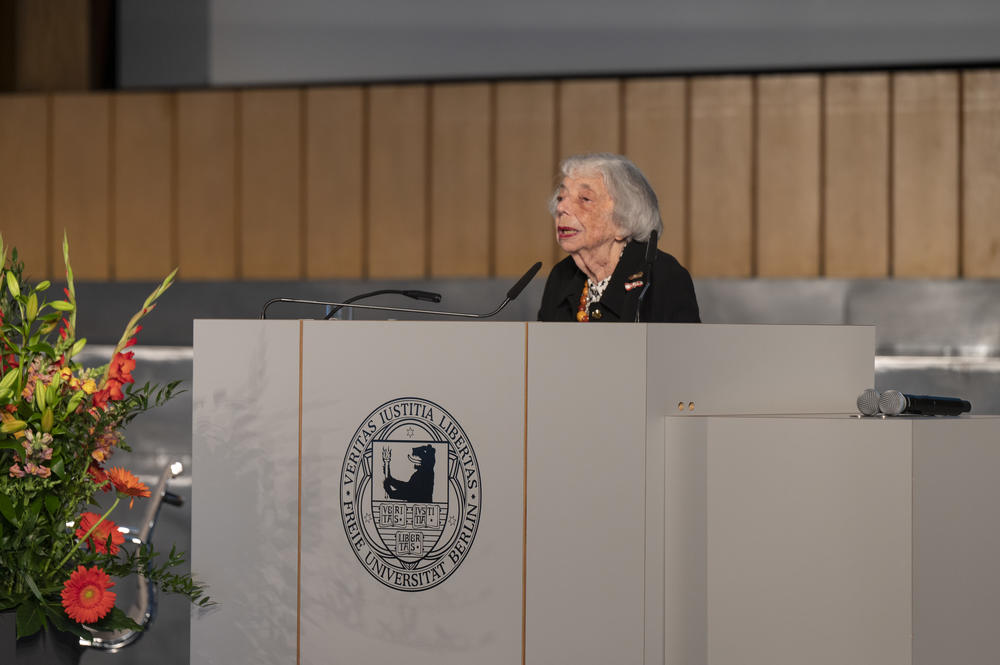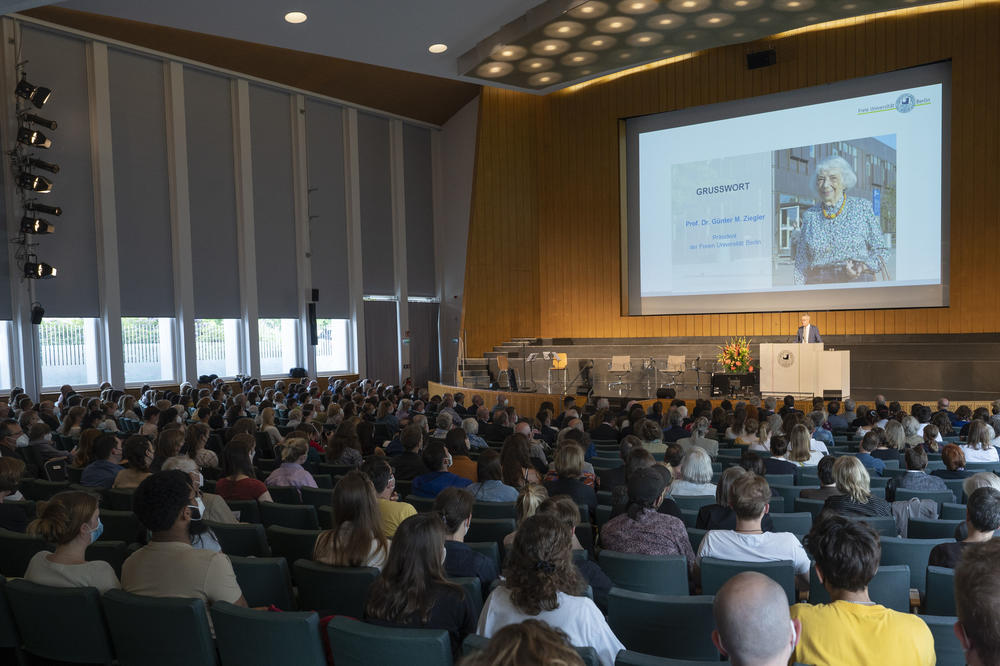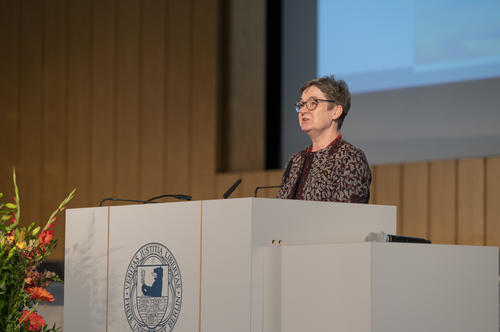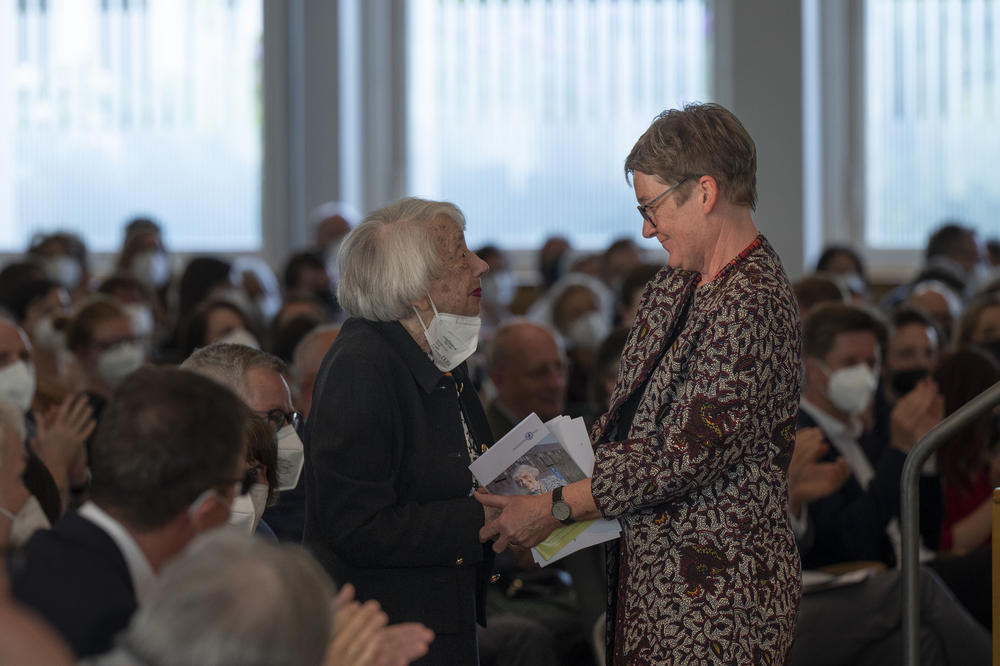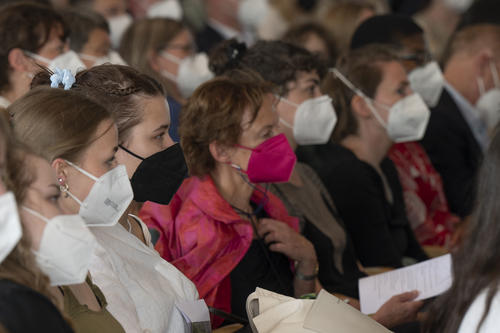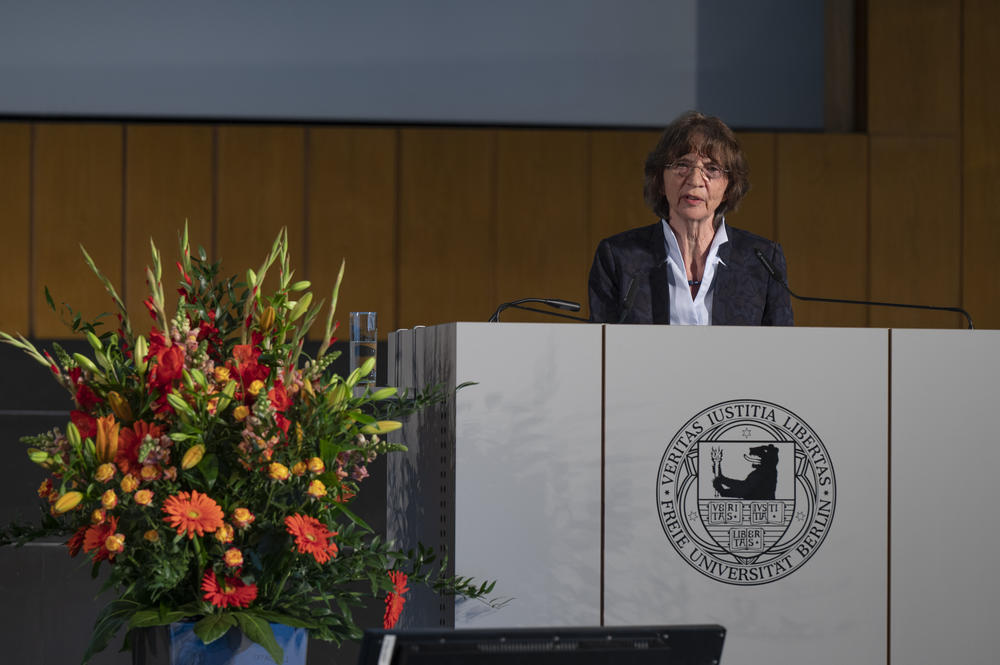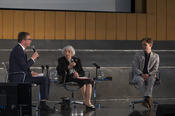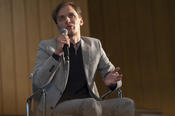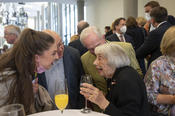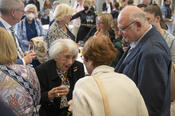“When I was in Berlin, I realized how much more I can achieve in Germany”
Freie Universität Berlin recognized the 100-year-old Holocaust survivor and writer Margot Friedländer with an honorary doctorate
Jun 04, 2022
Margot Friedländer is standing between the president of the university Prof. Dr. Günter M. Ziegler (left) and the dean of the Department of History and Cultural Studies Prof. Dr. Eun-Jeung Lee, who presented her with the honorary doctorate document.
Image Credit: Bernd Wannenmacher
Holocaust survivor and writer Margot Friedländer was awarded an honorary doctorate from Freie Universität Berlin. It was presented on Wednesday during an award ceremony in the Henry Ford Building of Freie Universität Berlin. The Department of History and Cultural Studies at Freie Universität Berlin had nominated Dr. Friedländer for this award.
The first time historian Professor Paul Nolte addressed Margot Friedländer with her new title, she had to laugh. At that moment, Paul Nolte and history student Vincent Bruckmann, who are sitting on stage with Friedländer for a panel discussion, simply laughed along, and the audience in the almost full Max Kade Auditorium of the Henry Ford Building joined in.
“Deeply Moved”
Shortly before, the 100-year-old Holocaust survivor Margot Friedländer had received an honorary doctorate from Freie Universität Berlin. And this moment, in which she created a connection to the audience, underlines the power of her central message: “Be human!”
“Be human!” – This is Margot Friedländer’s appeal and message, not only to the audience in the Henry Ford Building.
Image Credit: Bernd Wannenmacher
Shortly before in her acceptance speech Margot Friedländer had said that she was “deeply moved” by the award. She remembered her mother, who was murdered in Auschwitz, and her last message to her as a daughter: “Try to make your life.” Friedländer summed it up: “I think I have more than fulfilled my mission in the past 13 years.” In 2010, at the age of 88, she decided to move back from the United States to her hometown of Berlin.
“During my visits to Berlin, I noticed how much more I could achieve in Germany.” Even before that, she had begun visiting school classes, giving lectures, and organizing readings from her biography. Since she moved back, she has been tirelessly telling about her life – at events, on talk shows, even in front of the European Parliament – and always combined with the warning against antisemitism and totalitarianism. She repeated this warning on Wednesday evening at Freie Universität: “What people have done because they have not recognized people as people must never happen again!”
“For most people in our country, pluralism, equality and participation in social interaction are social consensus,” said the university president, Günter M. Ziegler. He pointed out that this is thanks to people like Margot Friedländer.
Image Credit: Bernd Wannenmacher
“Neighbors Turned Traitors and Murderers”
The Department of History and Cultural Studies honored her life’s work on May 25 at a ceremony awarding the title “Honorary Doctor of Philosophy.” In her speech, the dean of the department, Eun-Jeung Lee, quoted from the expert report that Margot Friedländer’s achievements as an exemplary “civic scientist” go far beyond conveying history she has experienced herself. She read from the report, “Margot Friedländer’s citizen science stands for independent forms of knowledge and reflection of the past, which have not only become indispensable for the history of National Socialism, but also for contemporary history and for historical and cultural studies in general.”
The president of Freie Universität Berlin, mathematics professor Günter M. Ziegler, also pointed out the complexity of Margot Friedländer’s life’s work in his speech: “As a contemporary witness, you are doing something that scholars cannot do in this form. Life stories like yours remind us of the need to keep coming to terms with our own history – individually and institutionally as a university.” Although Freie Universität was only founded in 1948, the university takes on the responsibility to conduct research and remember how the campus in Dahlem is connected with National Socialist crimes.
“She teaches us how to remember.”: Ulrike Gote, the Berlin Senator for Science, paid tribute to Margot Friedländer.
Image Credit: Bernd Wannenmacher
In her welcoming address, Berlin Senator for Science Ulrike Gote emphasized how omnipresent history is in Berlin. As a child, Margot Friedländer lived in Köllnischer Park, near the current location of the Berlin Senate Department for Science, Health, Care, and Equal Opportunities. Gote said, “Berlin, which was actually supposed to be home, became life-threatening during the National Socialist era. Neighbors became traitors and murderers.”
In her speech Berlin Science Senator Ulrike Gote thanked Margot Friedländer in ihrer Rede for reaching out and extending her hand.
Image Credit: Bernd Wannenmacher
“Margot Friedländer Teaches Us How to Remember“
Gote said she feels a sense of great humility and gratitude that Margot Friedländer has returned to her hometown and, despite everything she has experienced, reaches out to her fellow human beings. Referring to the war in Ukraine, Gote said: “Today we ask the question – and sometimes it is also a cry for help – how public attention to a crime can be sustained long enough to investigate it and take action. Margot Friedländer teaches us how to remember.”
Laudator Aleida Assmann pointed out that the presentation of the honorary doctorate was a very special event for the university and its guests and that by accepting the award, Margot Friedländer honored the university.
Image Credit: Bernd Wannenmacher
In her laudatory speech for Margot Friedländer, the literary and cultural scholar Aleida Assmann, a professor emeritus at the University of Konstanz, emphasized that remembering always needs a counterpart. “Remembrance is communication. It requires the closeness and interest of other people.” For a long time, remembering the Holocaust failed because of a double wall of silence. The survivors were faced with the impossibility of finding words for the unspeakable. At the same time, they encountered ignorance among their fellow human beings during the post-World War II period.
Literary and cultural studies scholar Prof. Dr. Aleida Assman gave the laudatory speech.
Image Credit: Bernd Wannenmacher
Laudatory speaker Aleida Assmann said that by accepting the award, Margot Friedländer honored the university. She added that just as the leaden silence with regard to remembering the Holocaust had been broken since the 1990s, Margot Friedländer also found her way to remember and to touch others with it. “Her biography is now available in many media formats, even as an interactive 3D production,” said Assmann. “Nevertheless, every personal appearance by Margot Friedländer remains a special experience for everyone present.”
“She Spoke to My Heart and My Mind”
Assmann pointed out that after encounters with contemporary witnesses, many people decide to become so-called secondary witnesses themselves and thus establish a personal connection between the past and the future. “But young people also need to be encouraged, empowered, and educated to do this. Schools and universities bear a share of the responsibility in this regard.”
Vincent Bruckmann, a public history student at Freie Universität, is one example. In the concluding conversation with Margot Friedländer and Paul Nolte, he described the strong the impression the eyewitness made on him. He said, “I first saw her at a reading at the Berlin State Center for Political Education, and it was a transforming experiece. She spoke to my heart and my mind.” As a result, Bruckmann organized a reading at Freie Universität in August 2019. It was attended by so many people that he spontaneously had to organize a larger lecture hall.
Asked by Paul Nolte whether her public life isn’t sometimes a burden, Margot Friedländer shook her head vigorously. She said, “It gives me an opportunity to tell young people that they too should try to live their lives. My brother Ralf never had that chance.” That is why, at the age of 100, she is still not thinking about retiring. She had to smile at herself again, while saying, “I’ll keep on as long as I can!”
This article originally appeared in German on May 27, 2022, in campus.leben, the online magazine of Freie Universität Berlin.
Further Information
About Margot Friedländer
Margot Friedländer was born on November 21, 1921. When the Nazis came to power, at first she managed to hide from them while remaining in Berlin. Her family was deported to Auschwitz and murdered. She herself was deported to the Theresienstadt ghetto. She survived and in 1946 emigrated to the United States with her husband Adolf Friedländer, whom she had met in Theresienstadt. After his death in 1997, she began to write down her memories. They were made into a documentary film called Don’t call it Heimweh, which was released in 2004. Her first return to Berlin was to make the film. In 2010 Rowohlt published her autobiography Versuche, dein Leben zu machen. The book title was taken from her mother’s parting words to her.
Margot Friedländer has made dialogue, especially with young people, her life’s work. Even before her final return from the United States to her hometown of Berlin in 2010, she visited school classes, held readings, and called for vigilance against antisemitism and totalitarianism.
In August 2019, Margot Friedländer, who was 98 years old at the time, visited Freie Universität Berlin to read from her book. A history student, Vincent Bruckmann, had extended the invitation and organized the event. Now, on May 25, 2022, he sat on stage with Margot Friedländer and Professor Paul Nolte and took part in a conversation about keeping the memory of the Holocaust alive.

